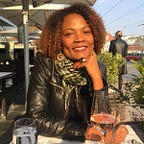WHAT DO YOU WANT?
One of the benefits of knowing YOU is that it allows you to discern what YOU want. Most of us live other people’s destiny rather than our own. And we do so for one, or several reasons: it’s what was put upon us by circumstances beyond our control; it’s all we are capable of dreaming for ourselves or, it’s what is expected of us by our family, or the society at large.
Shortly after I arrived in Lagos, I was asked by one of my Aunt’s visitors what I wanted to be when I grew up. ‘Doctor,’ I’d replied as assuredly as though the matter was already done and settled.
The question, and my subsequent answer, was within the hearing of my uncle’s wife. After the visitor left, Aunty said, ‘you…a doctor? You’re certainly full of pride for such an insignificant little girl.’ By this time, the full force of her unkindness was not yet on display. When I was asked the same question again by yet another guest, I had responded with the same answer.
Now, where did such self-assurance come from, you may wonder. Was my father, or mother, a doctor? No. Did I, perhaps, want to be a doctor because one of my numerous aunts and uncles was a doctor? Again no. So, why did I reply with such conviction that I wanted to be a doctor? The answer is simple. Firstly, it was the response expected of me. I was a Nigerian child, after all. In Nigeria, parents expect their children to be doctors, lawyers or engineers. ‘Mama Doctor’ or ‘Lawyer’ is a title that inflates a typical Nigerian mother’s heart with pride. As a child, there was nothing I wanted more than to make my parents and grandmother proud. Besides the pride inherent in the title, Nigerian mothers want their children to be doctors, lawyers or engineers because these are ‘viable’ professions and, therefore, most likely to bring in steady income. They want careers that will guarantee bread on their children’s tables, roofs over their heads, and clothes on their backs in a world full of uncertainty. To an average Nigerian mother, bread, shelter, and clothing are the most important on her children’s wish list. Happiness comes last. In any case, as far as a Nigerian mother is concerned, what’s there to be sad about if you are not hungry, destitute or naked?
Considering how my life turned out, I often wonder what my parents would have said if I’d told them that I wanted to be a writer or, heavens forbid, a dancer — my secret dream for a long time. ‘Dancing?’ My mother (bless her gentle heart) would have responded with all the disbelief her soul could muster. And would have followed that with ‘Will that put garri in your belly? Garri being the staple of the community. She would have concluded with a shake of her head and an expression that clearly said, this naïve, clueless daughter of mine…
The dream of being a doctor did not last too long under my uncle’s roof — not only because I was still a child and almost every child’s plan changes as often as the sun rises and falls, but because the idea was knocked right out of my head by his wife. A doctor? A slip of a child like me? Who was depending on her goodwill to even exist? The sheer audacity of someone like me getting that kind of aspiration was beyond Aunty’s comprehension. You see, long before she expressed it openly, my uncle’s wife had determined that enrolling in some typing course was all I was good enough for — and I say ‘course’ quite broadly here, the ‘school’ she had in mind for me and which she later tried to enrol me in was a roadside shack consisting of four solid sticks nailed to the ground and a tarpaulin for protection against the rains, the sun and the wind. Anyway, whenever my cousins would shout out their favourite profession (doctor, lawyer and of course engineer) and I dared to say anything other than ‘typist’ as my future profession, Aunty would stare at me pointedly, with so much disdain that my spirit would wilt and crawl back into itself. I soon learned to say ‘typist’ when people asked what I wanted to be when I grew up. That was how I learned that what we often say we want is rarely ever what we really want but are what other people think we should want instead. And that they convinced us to believe we want these things because they think it is all we are worth.
